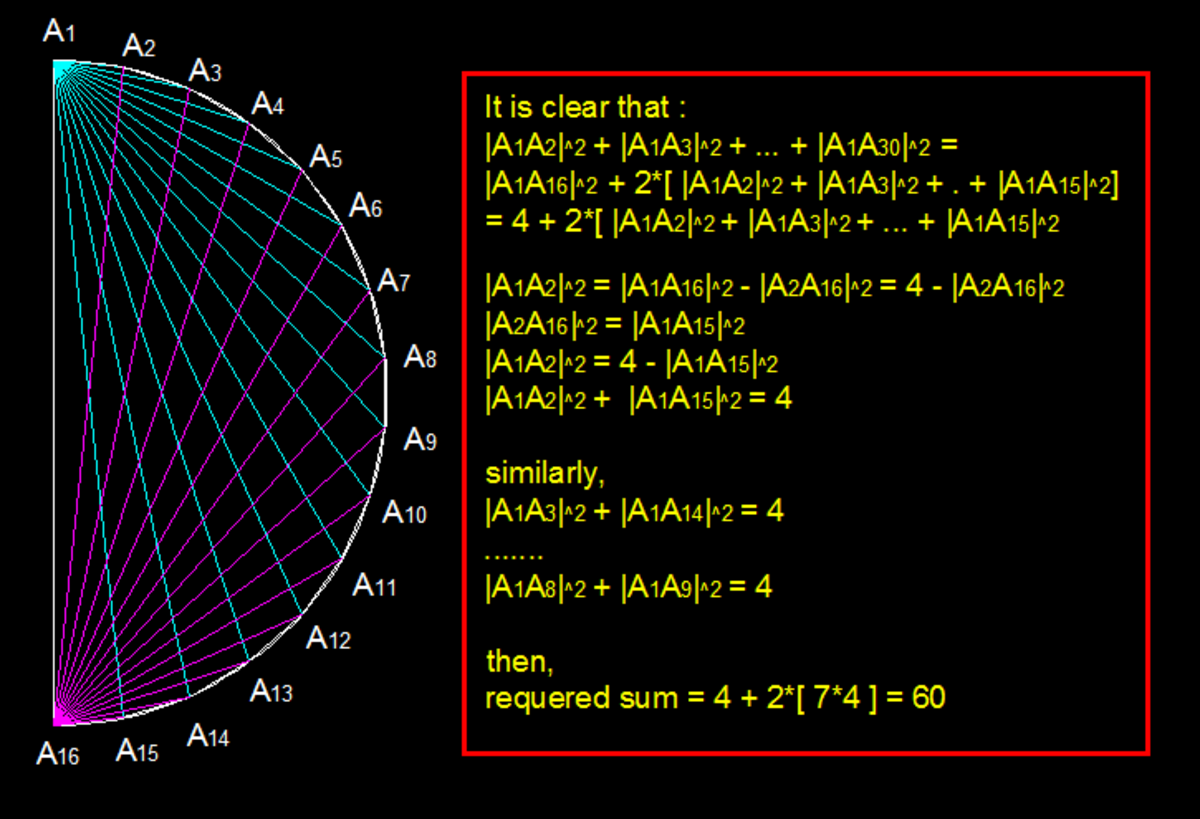A regular 30-gon
If A 1 , A 2 , A 3 , … , A 3 0 are the vertices of a regular 30-gon inscribed in a unit circle, then find
∣ A 1 A 2 ∣ 2 + ∣ A 1 A 3 ∣ 2 + ∣ A 1 A 4 ∣ 2 + ⋯ + ∣ A 1 A 3 0 ∣ 2 .
The answer is 60.
This section requires Javascript.
You are seeing this because something didn't load right. We suggest you, (a) try
refreshing the page, (b) enabling javascript if it is disabled on your browser and,
finally, (c)
loading the
non-javascript version of this page
. We're sorry about the hassle.
6 solutions
This is the exact way I solved it too. I think this solution should be way higher rated than it is.
What a solution!
Can you please explain in details ? Thank you.
Let w = e 2 π i / n , where n is the number of sides of the polygon. We want to find the sum: S = k = 0 ∑ n − 1 ∣ 1 − w k ∣ 2 = k = 0 ∑ n − 1 ∣ ∣ ∣ ∣ 1 − cos n 2 π k − i sin n 2 π k ∣ ∣ ∣ ∣ 2 = k = 0 ∑ n − 1 ( ( 1 − cos n 2 π k ) 2 + sin 2 n 2 π k ) = k = 0 ∑ n − 1 ( 2 − 2 cos n 2 π k ) = 2 n − 2 k = 0 ∑ n − 1 cos n 2 π k = 2 n − 2 Re ( k = 0 ∑ n − 1 w k ) = 2 n − 2 Re ( w − 1 w n − 1 ) = 2 n − 2 Re ( w − 1 1 − 1 ) = 2 n In this case we have n = 3 0 , so S = 2 ( 3 0 ) = 6 0 .
A splendid solution!
You can skip some of the steps in the middle if you notice ∣ 1 − w k ∣ 2 = ( 1 − w k ) ( 1 − w k ) = ( 1 − w k ) ( 1 − w − k ) = 2 − w k − w − k
That's one good solution! I liked it. :-)
U
s
i
n
g
C
o
s
L
a
w
,
w
e
h
a
v
e
2
9
d
i
a
g
o
n
a
l
s
.
S
o
:
−
i
=
1
∑
2
9
(
1
2
+
1
2
−
2
∗
1
∗
1
∗
C
o
s
(
3
0
2
∗
π
∗
i
)
)
=
6
0
.
I have used TI-83 Plus calculator with following pressed 29 times.
0 STO-> X ENTER
0 STO-> A ENTER
ENTER
ENTER
1
+
X
S
T
O
→
X
:
A
+
2
∗
(
1
−
C
o
s
(
3
0
X
∗
2
π
)
)
S
T
O
→
A
ENTER ENTER ENTER . . . ENTER....29 times.
Use simple trigonometry and get the sides of the polygon.Then add them up and use formula for trigonometric angles in Arithmetic progression.
Can you elaborate on it? I don't know what "simple trigonometry" you're referring to.
try to use cosine rule find length of the sides using radius of circle and angle subtended by the side.
Working up from equilateral triangle, square, regular pentagon, the pattern was compelling enough to chance a guess. No pen and paper available to attempt a proof!
What a pleasant and intriguing surprise! Thank you!
I know this doesn't constitute a solution, but just wanted to express my pleasure at an intriguing problem...
Log in to reply
Please refer to my proof for your observation. Sorry. It seems to have been canceled !!!
I don't see any pattern. How did you solve this?
Log in to reply
If n is the number of sides of the polygon, then the sum of squares we are trying to find turns out to be 2n. In the case n = 30, we have 2n = 60. I just used basic trigonometry to work out the n = 3, 4, 5 cases and when the answers came out as 6, 8, 10 ... I went with the most likely continuation... Didn't have pen or paper at the time to try and prove why...

Use the Pythagorean Theorem for this one. The diameter of the circle is 2 , so that the sum of the squares of the non-hypotenuse sides of any right triangle with the diameter as the base is 4 . Besides the diagonal that is the diameter itself, there are 1 4 other diagonal pairs that make for the sides of such right triangles. Hence, the answer is 4 ( 1 + 1 4 ) = 6 0
Example, for diagonal A 1 A 1 5 , choose diagonal A 1 A 2 to make such a pair that will form a right triangle, with base A 1 A 1 6 , etc.